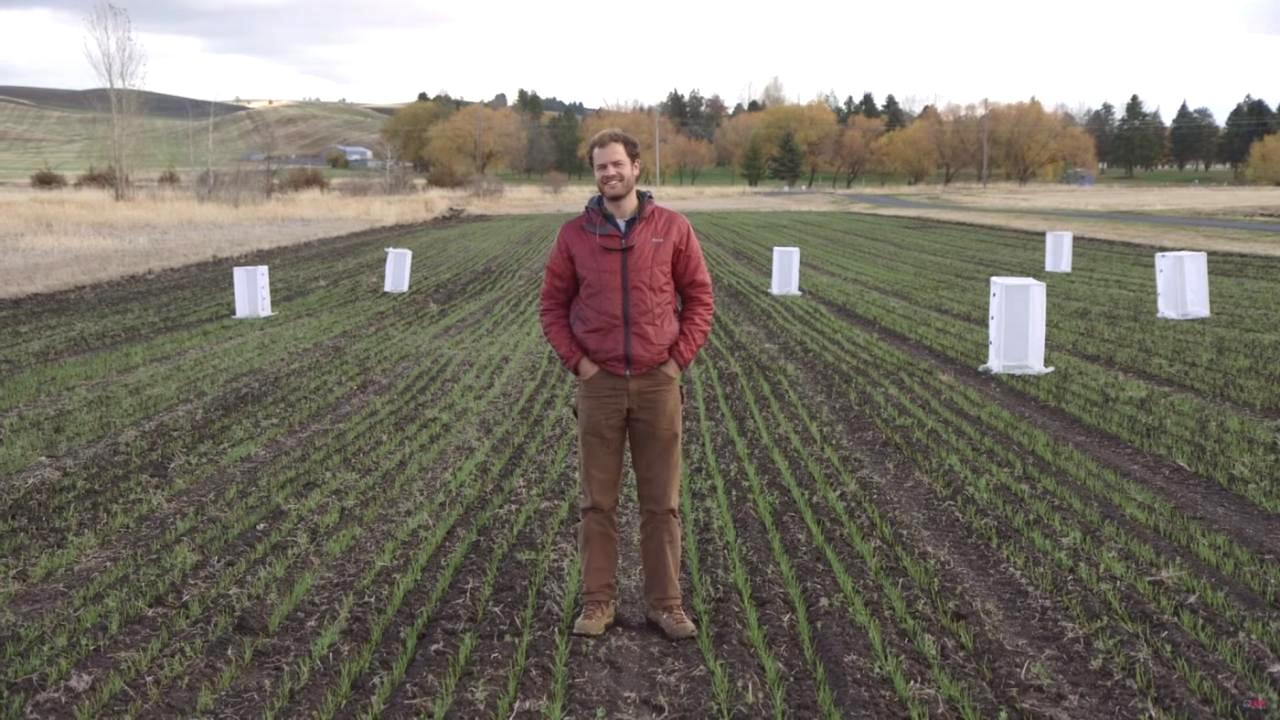Davis, California, USA
February 6, 2020
 Troy Magney, assistant professor in the Department of Plant Sciences, is just one of the researchers with the Smart Farm Big Idea who are working to turn agricultural data into comprehensible information for farmers.
Troy Magney, assistant professor in the Department of Plant Sciences, is just one of the researchers with the Smart Farm Big Idea who are working to turn agricultural data into comprehensible information for farmers.
- Big Data is a crucial piece in the Smart Farm Big Idea
- Big Data can help inform decisions on sustainable agriculture
- Can create more efficiency by programming data into automated farming machines
The volume of data produced globally is massive, tracking everything from how much television we watch, to worldwide weather patterns, to the nutrient content of the soil we use to grow food.
Currently, 2.5 quintillion bytes of data are generated each day — a nearly incomprehensible quantity — and that pace is accelerating. UC Davis Smart Farm Big Idea experts are tackling a big question about this data: How can we synthesize it into useful information that will benefit agriculture and farming?
Troy Magney, assistant professor in the Department of Plant Sciences at UC Davis, says the answer has the potential to revolutionize agriculture. Magney is developing methods for gleaning relevant details from the trove of global data.
One technique he is pioneering is hyperspectral imaging, a passive remote sensing technique that chops up the electromagnetic spectrum into many spectral channels. This allows him to look at segments of the spectrum and analyze how they respond to variables in the environment.
“We can study how certain plants are absorbing, emitting and reflecting light,” Magney said. “This can tell us about its water stress status, nutrient status, biomass, and photosynthesis, for example –– you can learn a lot about crop variability using these methods.”
Additionally, Magney uses lasers to quickly scan crop rows from a vehicle or overhead drone to create maps of canopy structure and nitrogen concentration. These maps can be used to make informed decisions about water and fertilizer management.
X marks the spot
While water is often a hotly debated topic in sustainable agriculture, Magney noted that fertilizer is equally important to precision farming. Using historical data, he builds nitrogen maps of fields so farmers can know precisely how much water and fertilizer was consumed by plants in different areas.
“Some farmers plug the data right into the computer on the tractor, and it will read the information and dispense the proper amount of fertilizer in each quadrant of the field,” Magney said. “Many agricultural entities have to report to the state each year how much water and fertilizer they use. This method helps store the exact data so they can create an accurate report.”
The right environment
Magney says UC Davis is the perfect place to study big data as a part of the Smart Farm Big Idea, because the expertise of researchers on campus spans from those studying the molecules of crops to others who are actually building new technologies to help farmers.
“This is the place to invest in for precision agriculture,” Magney said. “It’s an integrated approach, spanning many disciplines from all over campus.”
He added that UC Davis’ strong connections to the California agricultural community further enhance both the research and the outcomes.
“We aren’t just developing products for the growers; we have relationships with them. We are developing products with the growers and partnering with their expertise.”
Magney says donor support for Smart Farm would elevate this work while offering educational opportunities to students, enabling him to hire student research assistants for his lab. He is excited to teach first-generation college students from rural farming communities new techniques so that they can take what they’ve learned back home.
“We are training the next generation of farmers,” he said. “The ability to integrate technology into agriculture will be vital. It will change the landscape of farming as we know it –– and UC Davis students will lead the way into a new era of agriculture.”
(Original article by Trevor Stewart, Development and Alumni Relations, UC Davis; tpstewart@ucdavis.edu)